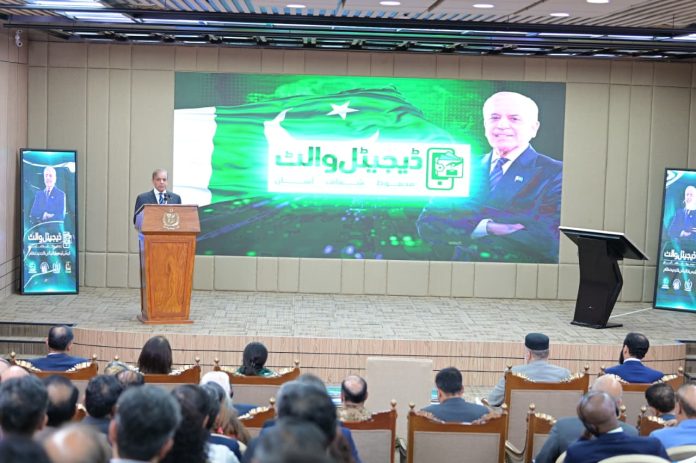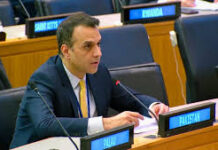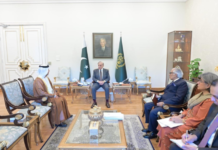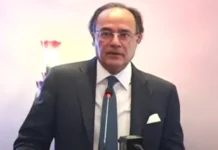ISLAMABAD, Aug 26 (Alliance News): Prime Minister Muhammad Shehbaz Sharif on Monday launched 10 million digital wallets for beneficiaries of the Benazir Income Support Programme (BISP), terming it a historic milestone in Pakistan’s journey towards transparency, financial inclusion, and the development of a cashless economy.
With a symbolic palm touch, the Prime Minister inaugurated the system in Islamabad, marking what he described as a transformative step towards empowering vulnerable households with secure and direct access to financial assistance.
The ceremony was attended by federal ministers, BISP leadership, senior government officials, and international development partners, including representatives from the German agency GIZ.
Addressing the gathering, Prime Minister Shehbaz congratulated BISP Chairperson Senator Rubina Khalid, the BISP management team, and partner institutions for what he called a “landmark decision that will safeguard genuine recipients and protect them from undue difficulties.”
“The digital wallet system is in its true sense blessed by the soul of Shaheed Mohtarma Benazir Bhutto, as it empowers BISP beneficiaries with safe, transparent, and direct access to financial assistance,” the Prime Minister said, underscoring the significance of the reform in protecting the dignity of recipients while ensuring accountability.
He emphasized that BISP, since its inception, had remained one of the most impactful social safety nets in Pakistan’s history, playing a vital role in poverty alleviation and income support for millions of underprivileged families.
However, he stressed the need to further expand the programme’s impact. “This is not just a financial support initiative but a foundation for poverty reduction and employment generation,” he remarked.
The Prime Minister termed the launch “a great leap towards a cashless economy” and highlighted that Pakistan’s digital transformation had already shown results.
He recalled that during the month of Ramazan, nearly 78 percent of the relief package was successfully disbursed through digital platforms, despite skepticism and resistance from what he described as “vested interests.”
“Cashless transactions are the pressing requirement of our times. They save time, eliminate corruption, and bring efficiency.
This is how Pakistan will progress rapidly in a competitive global environment,” he said, expressing his determination to integrate digital solutions across all sectors of governance.
Shehbaz Sharif revealed that despite initial indifference and lack of enthusiasm among some quarters, he had personally chaired multiple meetings to push forward the digitization agenda.
“I could sense the boredom on the faces of some officials when I insisted on digitization. But I knew this was the future—government-to-government, business-to-business, and even personal transactions must move towards digital platforms,” he said.
The Prime Minister also stressed the need to integrate social conditionalities into BISP to link financial support with education and health outcomes.
“If a family is receiving assistance, it should be linked with the condition that all children of that household attend school. Similarly, healthcare should be tied with BISP support. Only then will this programme become a true legacy benefiting millions of children,” he stated.
He urged the BISP leadership to reduce the existing eight to ten-month implementation cycle of initiatives to just four months, ensuring faster results for the people.
Concluding his address, the Prime Minister paid tribute to all stakeholders, including the State Bank of Pakistan, the Ministry of Information Technology, Pakistani banks, and development partners for their contributions.
“We are not just disbursing aid; we are raising an army of architects and workers to build the nation,” he said, underscoring the broader vision of transforming social protection into social empowerment.
Earlier, BISP Federal Secretary Amir Ali Ahmed briefed the gathering on the technical details of the initiative. He informed that under the Prime Minister’s direction, a high-level committee had been constituted to ensure transparency and ease of access in the digital wallet system.
“After today’s launch, 10 million digital wallets will be created using beneficiaries’ CNICs. The wallets will be supported by a biometric verification system to prevent identity theft,” the Secretary said.
He further explained that 10 million free SIM cards would also be distributed to BISP recipients, with the first phase already underway in Hyderabad, Sukkur, and Rahim Yar Khan in partnership with Jazz/Mobilink.
He added that the initiative would ensure women beneficiaries—who often face barriers in accessing banking services—receive direct, secure, and verifiable financial support without reliance on intermediaries.
BISP Chairperson Senator Rubina Khalid described the launch as an “important and historic milestone” in Pakistan’s social protection journey.
She said that BISP currently supports over 10 million impoverished families and that the new wallet system would not only provide financial assistance but also serve as a “pathway to social and economic empowerment.”
“Linking benefits to women’s CNICs has already given them recognition and inclusion in the national database.
The launch of these wallets will open further opportunities and will be accompanied by digital literacy programmes for women beneficiaries who are less familiar with technology,” she noted.
Senator Rubina emphasized that the new system was in line with the vision of Shaheed Benazir Bhutto, who had championed women’s empowerment as central to Pakistan’s progress.
She said the dream was carried forward by President Asif Ali Zardari and was now “excelling further under Prime Minister Shehbaz Sharif’s leadership.”
International partners, including GIZ, praised Pakistan’s efforts to digitize social safety nets, highlighting the move as a model of inclusive digital transformation in South Asia.
Observers noted that the programme not only guarantees transparency but also expands financial inclusion by bringing marginalized families, particularly women, into the formal financial sector.
The launch of 10 million digital wallets under BISP is widely regarded as a step that will redefine social welfare in Pakistan, ensuring that assistance is not merely a transfer of funds but a structured effort to build resilience, reduce inequality, and enable economic participation.
With this initiative, the government has sent a strong signal of its resolve to embrace technology as a tool of governance, accountability, and empowerment. By linking financial support with education and health, and by ensuring transparency through biometric verification, the BISP digital wallets are poised to set a new benchmark for social protection systems in Pakistan and beyond.






